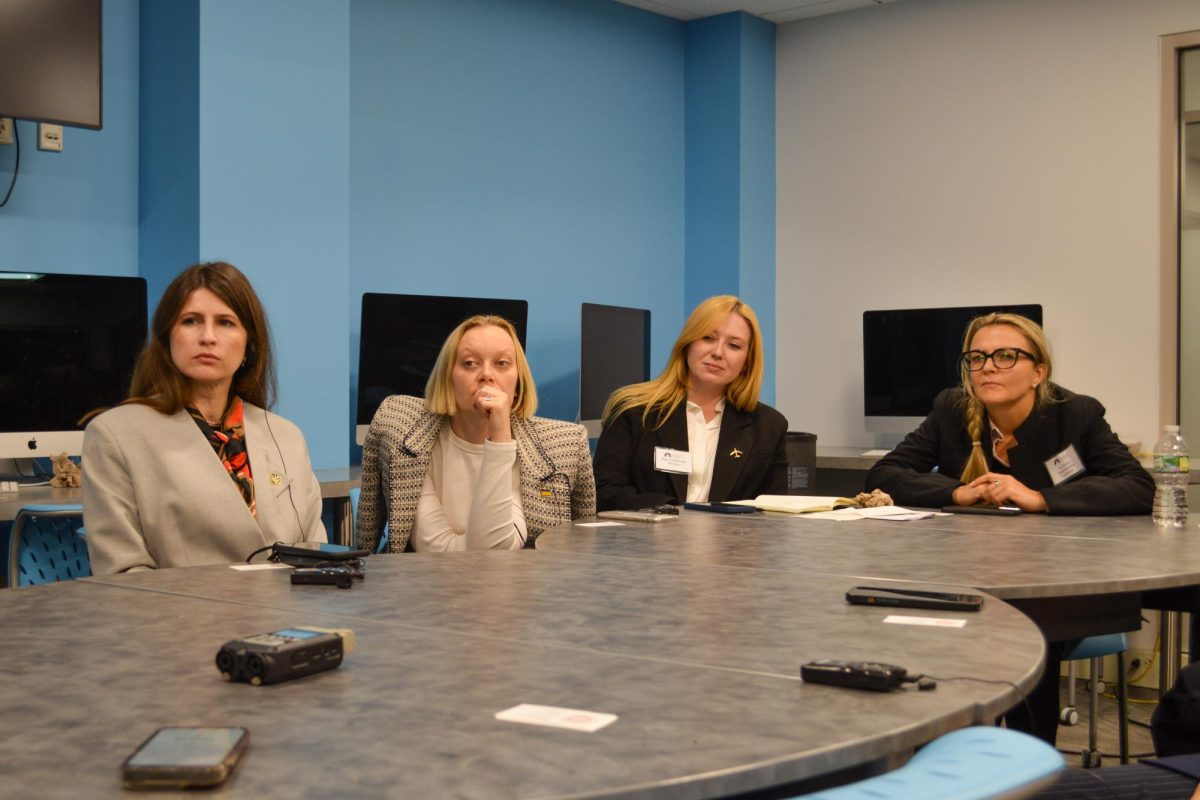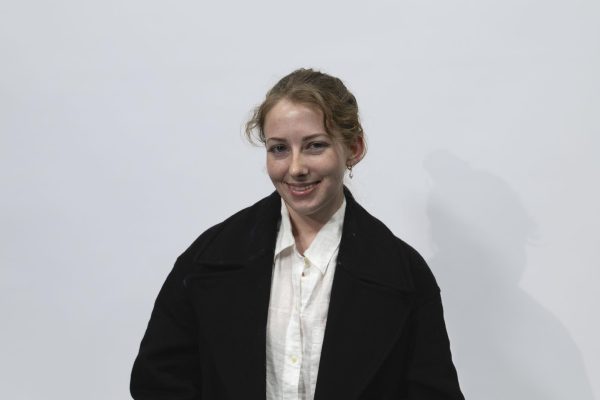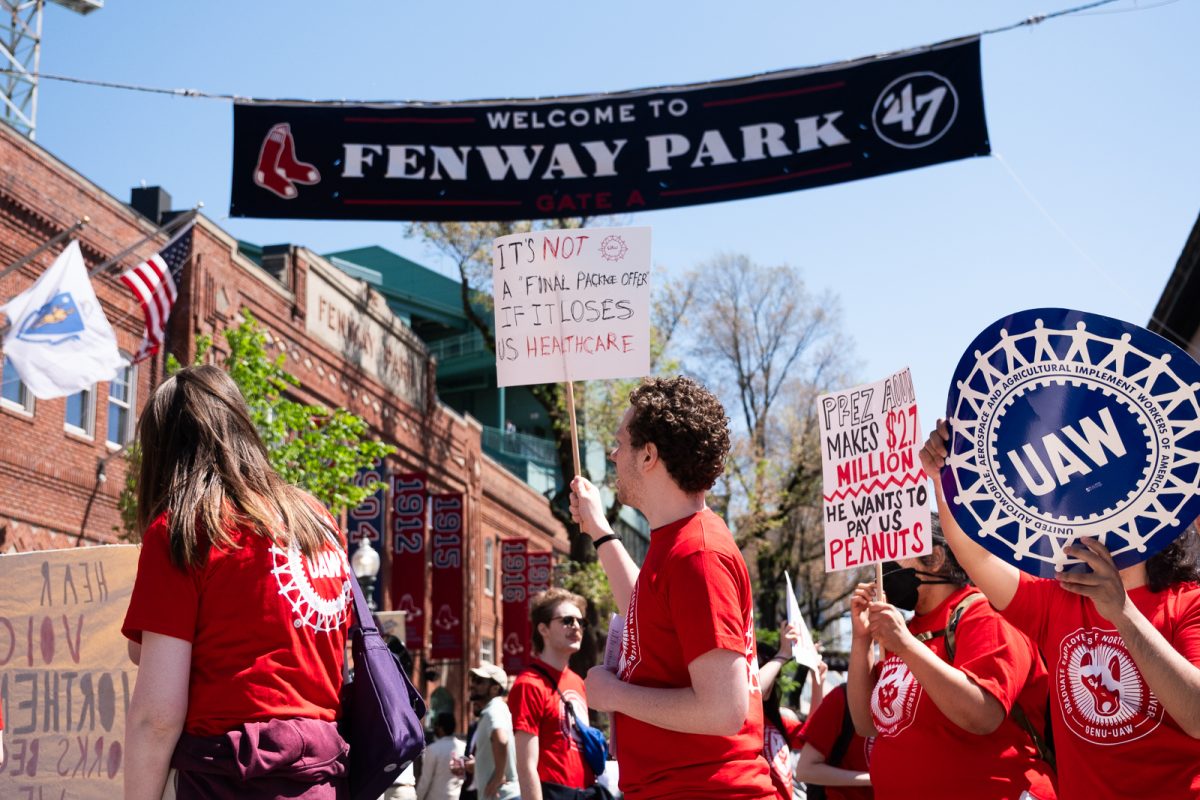Six Ukrainian public communications experts gathered in Holmes Hall Oct. 31 to discuss the role of the media in the coverage of Russia’s full-scale war against Ukraine, which is approaching 1,000 days as of November.
The discussion, moderated by journalism professor Matthew Carroll, was part of a learning tour around the United States organized by the U.S.-Ukraine Foundation in which the visiting officials sought to gain an understanding of public communications practices in the United States.
The primary goal is to use insights from their visit to develop international partnerships and improve the communication infrastructure in Ukraine, as well as to explore new ways to use communication strategies to support Ukraine’s reform and recovery, said U.S.-Ukraine Foundation Vice President John Kun, who was also in attendance.
Some of the visiting delegates, such as Yuliia Viktorivna Yanchuk, deputy director of the Department of Information Policy and Security within Ukraine’s Ministry of Culture and Strategic Communications, were particularly interested in hearing about how Northeastern students are taught about communications.
“I am interested to know how you teach students to distinguish truth, and how to react to the rapid development of new technologies,” Yanchuk said in her personal introduction.
Another delegate who took an interest in the education of American journalism students was Viktoriia Oleksiivna Oliinyk, media policy advisor for the military administration of the Mykolaiv region of Ukraine. Oliinyk, one of three delegates using interpreter Peter Voitsekhovsky to translate between English and Ukrainian, introduced a new conversation topic about traditional U.S. journalism practices and how they may not be the ideal approach to covering Ukraine.
“We know that there’s a standard of journalism to present at least two viewpoints, but in Ukraine, in the times of war, we have to change the standard,” Oliinyk said, translated by Voitsekhovsky. “We cannot present the other side’s viewpoint equally when it is lies. We have to understand that Ukraine is the side that says the truth and Russia is saying lies. It’s their propaganda. It’s always been like that. It’s a fact of life.”
Oliinyk described a recent case in which a Russian airstrike destroyed a residential building in Kharkiv Oct. 30, killing two and injuring 34. An 11-year-old child was among the dead. Russian propaganda channels wrongfully said the strike was against Western adversaries, Oliinyk said.
In response, Carroll identified the success of media policy initiatives from military administrations like those in Oliinyk’s line of work. However, he admitted that he didn’t have a set solution for the lack of American attention on Ukraine.
“I think you’re doing the right thing by inviting reporters in and having them observe and talk to Ukrainians,” Carroll said. “There is a little bit of war fatigue in the U.S. now, so people are paying less attention to what’s happening in Ukraine than they were two years ago, three years ago. I don’t know what you can do about that. Keep trying, I guess.”
Yanchuk pointed out another hole in the fabric of American media coverage of Ukraine, this time in regard to misinformation like Russia’s false claims about the attack on Kharkiv.
“Russian propaganda spent significant resources to create fake news stories and propaganda accounts and spread [it] in all possible channels all around the world 24/7,” Yanchuk said. “Ukraine has extraordinary experience in fighting Russian disinformation. In Ukraine, we assume that the core of this is media literacy, because people should have critical thinking to understand what is false and what is truth.”
One of the delegates, adviser to the Ukrainian Minister of Veterans Affairs Alina Anatoliivna Karban, suggested to Carroll a method of teaching media literacy used in Ukraine that she believes could be useful. Karban, also speaking through Voitsekhovsky, explained how the satirical website UaReview is used as a unique approach to fighting fake news and AI-generated misinformation on the internet.
“It’s something similar to The Onion in that it’s intended to create funny but not true stories, but they are so fascinating that people start believing in them,” Karban said. “When we teach school children what information hygiene is, we give them four news stories, three of which are taken from there and one of which is true.”
Media literacy was not the only recommendation brought up by the delegates. Yevheniia Yemshenetska, project manager at the Ministry of Foreign Affairs of Ukraine, pointed out issues with the language American journalists use when covering Ukraine.
“As journalists, you know better than others that words matter,” Yemshenetska said. “Wording is important and so sometimes just using synonyms will not show the picture of the whole situation. So, for example, we had this vocabulary agreement for journalists to use only ‘war,’ not ‘conflict.’ And we never use ‘war in Ukraine,’ we use ‘war against Ukraine.’ It’s small things, but they matter.”
Carroll compared this to the transition in journalism from using terms like “homeless” to “unhoused.” Yemshenetska agreed, but emphasized that word choice often has a significant impact on meaning.
“War is war,” Yemshenetska said. “Conflict is an entirely different thing.”
Oliinyk brought up how this transition is not always easy, and even Ukrainian journalists have to adapt to not using typical slang or casual wording in their writing.
“Instead of just saying ‘enemy,’ we are recommended to say ‘Russia’ or ‘Russian military,’” Oliinyk said. “We sometimes use nicknames, like ‘the orcs,’ but we have to say straightforwardly, ‘Russia’ or ‘Russian soldiers.’”
Responding to a question about recent reports of North Korean soldiers joining Russian troops to fight Ukraine, Oliinyk admitted that Ukrainian media does not yet have a term to describe them. Karban, however, had a message on the subject that she wanted to make sure American media received.
“We want the people to know that we are going to kill them just like we’ve been killing Russians,” Karban said. “Because if we don’t, they will kill us.”
Inga Vyshnevska, head of media at We Are Ukraine, suggested that Ukrainian media coverage from the front often provides better information and provided some resources she believes Americans should be more reliant on than personal anecdotes on social media.
Vyshnevska also recommended English-language media outlets including The Reckoning Project, The New Voice of Ukraine, The Kyiv Independent, Ukraine Forum, Channel Freedom, Voice of America and the websites and social media accounts of any official Ukrainian government office or ministry.
The Huntington News is dedicated to serving the Northeastern University community with original, professional reporting and creating an environment in which student journalists can learn from one another. Support an independent, free press at Northeastern University with your donation today.











